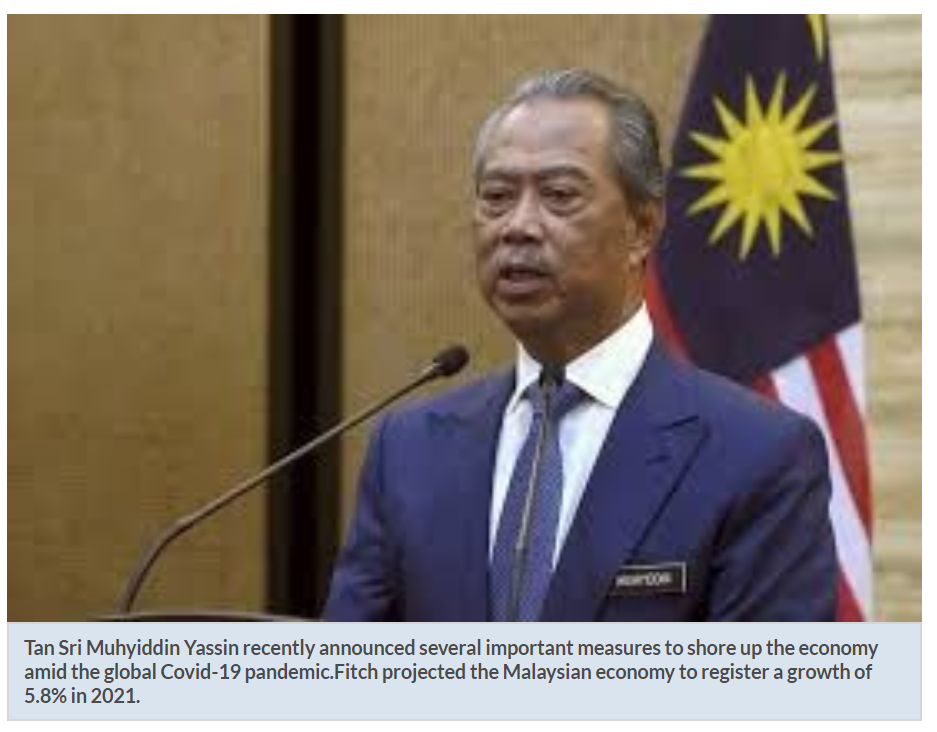Malaysia: Fitch retains long-term rating, GDP to grow 5.8% in 2021
PETALING JAYA: Fitch Ratings has affirmed Malaysia’s long-term foreign-currency issuer default rating (IDR) at “A-”. The agency has however revised the outlook from “stable” to “negative”.
According to a statement by Finance Minister Tengku Datuk Seri Zafrul Tengku Abdul Aziz, yesterday, Fitch has also projected the Malaysian economy to register a growth of 5.8% in 2021.
“Globally, countries have responded with substantial fiscal and monetary measures to cushion the economic impact of Covid-19. It has also been observed that the sovereign ratings outlook for several economies, both advanced and emerging, have also been lowered.”
Zafrul said Malaysia has responded to the global health crisis and synchronised worldwide economic shock in a timely, decisive and comprehensive manner.
“The recently launched RM260bil economic stimulus package, dubbed Prihatin, had outlined its three main thrusts: “Protect the People, Support Businesses and Strengthen the Economy.”
“Prihatin’s public health, fiscal, monetary and financial measures are aimed at protecting lives and vulnerable groups in society, alleviating businesses’ cash flow pressure and preserving jobs.”
Collectively, Zafrul said Malaysia’s economic stimulus measures are expected to add 2.9 percentage points to its 2020 gross domestic product (GDP), adding that these comprehensive measures would place Malaysia on a stronger footing to benefit from the projected global recovery in 2021.
“Despite the sizeable fiscal outlay in the economic stimulus packages, the government’s commitment towards fiscal discipline has not wavered. To ensure limited medium-term implication to public finance, measures introduced are one-off, temporary and time bound.
“As these measures are non-recurring expenditures, fiscal consolidation efforts will resume once health and economic conditions stabilise. Further supporting this is the government’s positive track record of fiscal consolidation where the fiscal deficit has declined by half from -6.7% of GDP in 2009 to -3.4% of GDP in 2019.
Zafrul added: “The government will continue to focus on governance and structural reforms to place the country on a firmer footing.
“The government remains committed to a reform agenda ensuring sound governance, strengthening institutions and combating corruption even as it pursues existing initiatives with the establishment of the debt management office and the upcoming enactment of a Fiscal Responsibility Act in 2021.
“The medium-term fiscal strategy will be enumerated in the fiscal outlook and federal government revenue estimate report that will be issued together with the 2021 Budget in October 2020.”
Zafrul said Malaysia continues to maintain a healthy external position with substantial external assets by banks and corporations, a current account surplus and adequate level of international reserves.
“Malaysia’s foreign currency external assets continue to exceed its foreign currency external liabilities. As at end-2019, Malaysia’s net foreign currency external asset position stood at a sizable RM924bil, as 94.5% of external assets are denominated in foreign currency compared to 41.4% of total external liabilities.
“Together with the flexible exchange rate, these will continue to serve as important buffers against potential external shocks.”
While the Covid-19 crisis poses some risks to financial stability,Zafrul said Malaysian banks are now much more resilient compared to previous crises.
“In particular, the strong buffers of the banking system that have been built over the years and sound risk management practices are expected to mitigate the impact of any deterioration in credit quality and support continued lending by banks to the economy.
“Notably, excess capital buffers of banks stand at RM121bil, more than three times the buffer during the 2008/ 2009 Global Financial Crisis. Net impairments remain low at only 1% of total banking system loans. The banking industry’s liquidity coverage ratio, at 148%, stands well above the minimum requirement of 100%.”
Zafrul said these buffers, along with sound and prudential risk management practices, place banks in a good position to support lending activities and the overall Malaysian economy.
Source: https://www.thestar.com.my/business/business-news/2020/04/10/fitch-maintains-long-term-malaysia039s-rating-downgrades-outlook


 English
English




